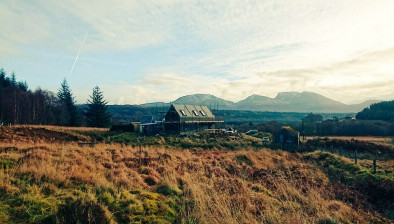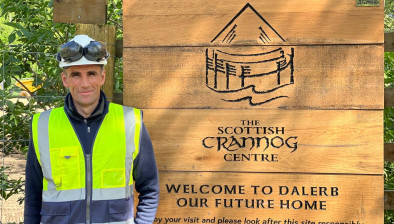And finally… Perthshire firm has Grand Designs on future growth following TV appearance

Scottish construction business JML Contracts will feature in this week’s Grand Designs show (Wednesday 25 October) after carrying out work on what is potentially the smallest two-bedroom house in London.
The show features a ‘compact’ property in the capital built on a site of approximately 9.5m x 4m.
Auchterarder-based JML Contracts believes the project will clearly demonstrate why demand is growing for its “highly energy efficient and speedy house building method” using Structural Insulated Panels (SIPs).
The SIPs method was selected for the construction to allow for specific design considerations; to deliver a speedy and precise build time; and to ensure optimum thermal efficiency of the completed home to Passive House standard. JML, based in Perthshire, was appointed as the key provider due to its strong credentials, specialised and bespoke SIPs offering and understanding of the engineering requirements of the project.
This demand for SIPs is beginning to gain some ground in the UK, as people begin to see the benefits which have been embraced wholeheartedly in northern Europe. JML has seen business growth of 30% year on year since 2015, and is projected to continue at this pace each year until 2020.
 JML director John Langley said: “SIPs is one technology which could help to reshape the future of housebuilding in the UK but the country still lags behind in its uptake. The previously slow adoption of SIPs is largely down to the higher upfront costs, however the long-term benefits for residents, landlords and the environment significantly outweigh these initial outlays. These benefits include low energy usage due to the excellent insulation, limited thermal bridging, and inherently air-tight characteristics.
JML director John Langley said: “SIPs is one technology which could help to reshape the future of housebuilding in the UK but the country still lags behind in its uptake. The previously slow adoption of SIPs is largely down to the higher upfront costs, however the long-term benefits for residents, landlords and the environment significantly outweigh these initial outlays. These benefits include low energy usage due to the excellent insulation, limited thermal bridging, and inherently air-tight characteristics.
“Our business which employs 21 people in Perthshire has seen a 30 percent growth in the past two years. We are predicting that this level of growth will be sustained for the next three years, as awareness of the benefits of SIPs grows and demand increases across Scotland and beyond. As well as the self-build market we are seeing increased interest from housing associations, social housing and also the emerging Private Rented sector.”
As part of the filming for this specific Grand Designs project, presenter Kevin McCloud visited JML’s factory in Auchterarder, with the architect client to see the team construct the house in advance. This was the first time the team had visited a SIPs factory before, and also the first time they had ever completed a pre-construction.
The SIPs method requires very specific engineering processes which means that each piece is designed and cut in advance and then slotted together in a short time using a ‘jigsaw-style’ approach when on site – or in a factory.

John Langley added: “This was a really great experience for the whole JML team and we were delighted to meet Kevin and his Grand Designs colleagues. This project was a really interesting and challenging one from the outset and the end result is fantastic. By using SIPs in this project so many of the client’s requirements were met and it really demonstrates why and how SIPs and its many benefits is becoming a popular method of choice for self-build and custom build developers.”
Joe Stuart, of JSID Ltd, the architect and owner of the house, said: “Working with JML Contracts was great. They were knowledgeable and eager to advise, acting almost as an extension of my own team. After a thorough build up tweaking the design with the engineering team to get it completely right, the factory team was able to turn around the manufacturing incredibly quickly.
“The design of the kit was suited to the tight site, and the team was on call for any support required whilst I built the kit over 400 miles away! The structure was erected by hand within a week.”
The project which in total took 23 months and cost approximately £250k to complete and was heralded for its approach based on the complexity and size of the plot in a dense urban area.





















